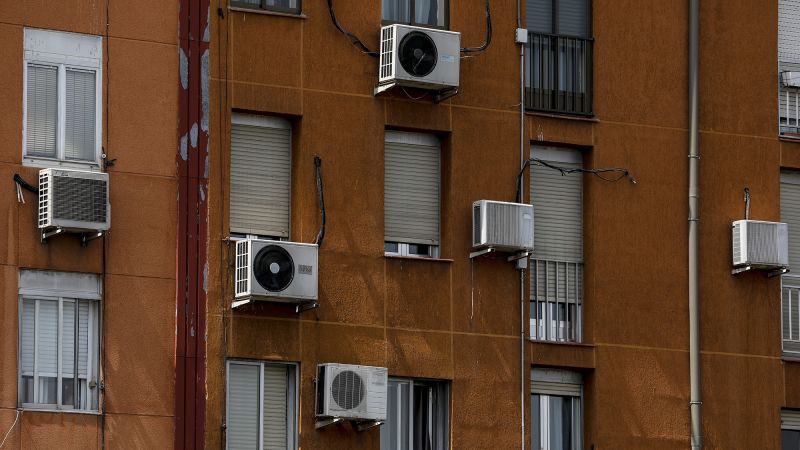Abrutal heat waveisgrippingmany parts of Europe, leaving millions of people struggling to adapt to punishing, record-breaking temperatures. Heat persists even at night, with temperatures in some places not dipping much below 90 degrees.
There is little respite. Air conditioning is very rare in European homes. Many residents are being forced to ride out the searingheat with the help of electric fans, ice packs and cold showers.
But Europe hasn’t approached heat in the same way as the historically hotter United States. Whilenearly 90%of US homes have air conditioning, in Europe it’s around 20%, and some countries have much lower rates. In the United Kingdom, onlyaround 5%of homes have cooling systems — many of which are portable AC units. In Germany, the figure is3%.
As climate change drives moresevere and prolonged heat waves, which arrive earlier and earlier, some are questioning why wealthy European countries have been seemingly reluctant to adopt air conditioning — especially as the heat takes anincreasingly deadly toll.
A big part of the reason is many European countries historically had little need for cooling, especially in the north. Heat waves have always happened but rarely reached the prolonged high temperatures Europe now regularly endures.
“In Europe… we simply don’t have the tradition of air conditioning… because up to relatively recently, it hasn’t been a major need,” said Brian Motherway, head of the Office of Energy Efficiency and Inclusive Transitions at the International Energy Agency.
This meant AC has traditionally been seen as a luxury rather than a necessity, especially as installing and running it can be expensive. Energy costs in many European countries arehigherthan in the US, while incomes tend to be lower.
Energy prices haveriseneven further since Russia invaded Ukraine in 2022, as the EU takes steps tophase out its relianceon Russian oil and gas. Though prices havestabilizedsince the initial energy crisis of 2022, the cost of powering an AC unit may still be out of reach for many Europeans.
Then there’s the architecture.
Some buildings in hotter, southern European countries were built for the heat. They have thick walls, small windows that keep the sun from beaming inside and are designed to maximize air flow. This has helped keep them cooler and lessened the perceived need for artificial cooling.
In other parts of Europe, however, homes have not been designed with heat in mind.
“We haven’t been in the habit … of thinking about how we stay cool in the summer. It really is a relatively recent phenomenon,” said Motherway.
Buildings on the continent tend to be older,built before AC technology became mainstream. In England, which has just endured its hottest June on record, one in six homes werebuilt before 1900.
It can be harder to outfit older homes with central cooling systems, although far from impossible, Motherway said.
Sometimes a bigger problem is red tape, said Richard Salmon, the director of the Air Conditioning Company based in the UK.
UK authorities will often reject applications to install AC “on the basis of the visual appearance of the outdoor condenser unit, especially in conservation areas or on listed buildings,” he said.
There is also a policy angle. Europe has pledged to become “climate neutral” by 2050 and a sharp increase in air conditioners will make climate commitments even harder to reach.
Not only are air conditioners energy guzzlers, but they also push heat outside. Astudylooking at AC use in Paris found they could increase the outside temperature between about 2 and 4 degrees Celsius (3.6 to 7.2 Fahrenheit). This impact is especially severe in Europe’s generally dense cities.
Some countries haveimposedmeasures to limit air conditioning. In 2022, Spain introduced rules stipulating AC in public places should be set no lower than 27 degrees Celsius (80 degrees Fahrenheit) to save energy.
Attitudes and concerns around AC in Europe are changing, however, as the continent becomes a climate hotspot, warming at twice the rate of the rest of the world.
The continent faces a dilemma: embrace energy-intensive air conditioning, with the negative climate impacts it brings, or find alternative ways to cope with its ever-hotter future.
“Our homes need to be resilient not just to the cold, but to the increasingly brutal heat,” said Yetunde Abdul, director at UK Green Building Council.
There are already clear signs uptake is increasing in Europe, as in many parts of the world. An IEA report found the number of air conditioning units in the EU is likely to rise to 275 million by 2050 — more than double the 2019 figure.
The Air Conditioning Company’s Salmon says he has seen demand for air conditioning skyrocket. “Over the last five years, residential enquiries have more than tripled. This heatwave in particular has sent things through the roof… People just can’t function when they’re boiling at 3 a.m.”
Some politicians are pushing for a sweeping uptake of AC.
France’s far-right politician Marine Le Pen hasvowedto implement a “major air conditioning infrastructure plan,” while criticizing the “so-called French elites” who encourage others to seek alternative cooling methods while they “obviously enjoy air-conditioned cars and offices.”
But experts warn AC may be a quick reprieve from scorching temperatures but it gobbles up energy, most of which still comes from planet-heating fossil fuels.
Using fossil fuel-powered AC increases planet-heating pollution, which in turn increases temperatures, fueling “a vicious cycle of worsening climate change,” said Radhika Khosla, an associate professor at the Smith School of Enterprise and the Environment at the University of Oxford.
The reality is mindsets around AC are undoubtedly going to change in Europe, as extreme heat — and its health impacts — increases, IEA’s Motherway said.
The challenge will be making sure countries have strong regulations around the efficiency of cooling systems to reduce their potentially huge climate impact.
“Because every air conditioner sold today locks in energy use and emissions for the next decade or two decades. So it’s important we get this right first time.”
